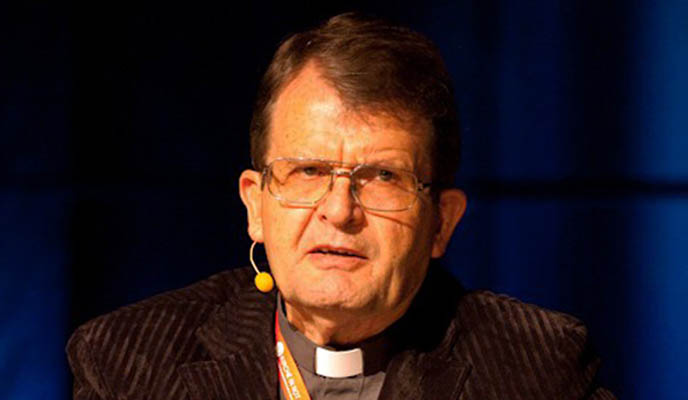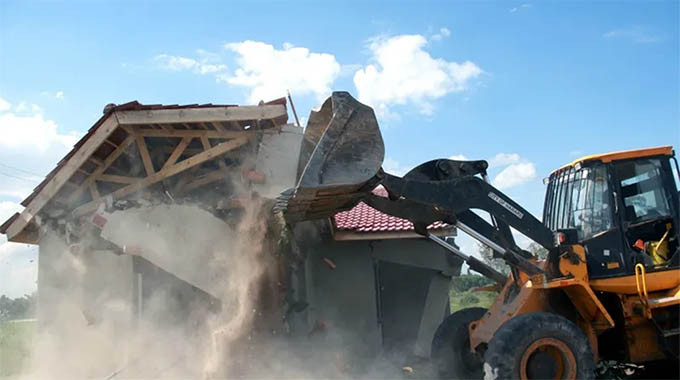
We find it hard to speak the plain truth. So often we are misguided into saying what we do not believe in ourselves. Spirits fill our minds with rumours. We believe in the devil and demons more than in truth and light.
guest column: Fr Oskar Wermter SJ
People blame spirits and demons for their children’s misfortunes, but do not accept their own responsibility. People believe in demons and blame them for all calamities. They long for spirits they can blame for what is going wrong in their lives. They no longer accept their own errors and blunders, but see the devil and the evil one everywhere. There is always a longing for scapegoats whom they can blame and send into the desert to rid them of their failures. They act like little boys whose football has smashed a window “George did it. Not me !” It is not always individuals that are regarded as demonic, satanic or evil. The whole world is being suspected of being in cahoots with evil spirits or demonic forces.
“In the Bible a scapegoat is an animal which is ritually burdened with sins of others then driven away. The concept first appears in Leviticus, in which a goat is designated to be cast into the desert to carry away the sins of the community.” (Leviticus 16v20–22). The New Testament uses “scapegoat (the lamb) as a metaphor for Christ, “John said, ‘Look, there is the Lamb of God who takes away the sin of the world“(John 1v29).
We are used to burdening others with our own failures, sins and even outright crimes. This is the secular version of the “scapegoat” as found in ancient religions and rites. In our own culture, we observe that witchcraft beliefs give people relief from guilt and failure to live up to the moral demands of society. For instance, a business manager may seek a plausible explanation for the bankruptcy of a business which he ruined.
In politics, witch-hunting and scapegoating are very popular escape routes for politicians who have been blamed for failure. Lawyers defending offenders try to get them off the hook by shifting the accusations against them to others to evade responsibility.
“Scapegoating” is the exact opposite of what our attitude and behaviour should be: mature grown-ups accept responsibility for all their actions. They do not look for a scapegoat who can be blamed and free us from responsibility.
If we claim sovereignty for social groups (independent States and social classes), then we must concede sovereignty also to individuals and persons who think for themselves and decide for themselves. But persons who believe in witches, demons and spirits have sold out on sovereignty and are now controlled by the spirit world, without the self-control of persons and individuals. They can no longer claim ownership of their individuality and unique character.
- Chamisa under fire over US$120K donation
- Mavhunga puts DeMbare into Chibuku quarterfinals
- Pension funds bet on Cabora Bassa oilfields
- Councils defy govt fire tender directive
Keep Reading
Xenophobia and the violence found in conflicts with strangers may have a similar background. A country in crisis may blame migrants and strangers for the failures of its own policy. It is often outsiders that are used as “whipping boys” (or girls for that matter), being punished for misdeeds, not of their own, but committed by others. If there is an epidemic killing large numbers, it is convenient to blame an old woman who is unpopular and has few friends, and drive her out of the village as a witch. Anyone who is a loner and is known for behaving in strange ways may be burdened with the sins of the village, to go and suffer and get rid of the collective guilt in place of her fellow villagers.
McCarthyism in the US in the early 1950s of the last century was such a case. There was rather hysterical anti-Communism in the political crisis of the post – World War II confusion when the general hatred and mutual suspicion among US citizens needed an outlet.
Apartheid South Africa acted in a similar way when the country was universally considered an outcast. Somebody had to be blamed for the effects of widespread anti-South African feelings in the world. So this paradise for outdoor sportsmen and women was barred from the Olympics because of their racism and widespread contempt for the indigenous majority in their very mixed population. There was legislation to make it possible to ostracise anyone with Communist sympathies. Hatred and suspicion play a deadly role in isolating criminals, habitual offenders and unpopular members of the public.
Even support for the death penalty and the execution of public enemies was a form of “scapegoating”. An execution is like offering a substitute so as to be able to escape from the blaming game. In pre-Christian times even humans were sacrificed to avert the anger of the gods and spirits.
Germany had lost a war. The army and the political class did not want to take the blame. The Jews in the country had a very visible presence as intellectuals, scholars, successful and prosperous business people. So a huge propaganda campaign destroyed the good name and reputation of Jews many of whom had been good friends of their indigenous neighbours. Radio broadcasting and TV had just been invented and served as a tool to avert one’s guilt and load it on a “sacrificial lamb.
“Scapegoating” goes together with envy and jealousy: successful people fill their rivals with a spirit of hatred and hostility.
People with a guilty conscience try to rid themselves of the guilt — and the self-contempt that goes with that — by shifting the guilt on to someone else. That will free them from this burden which weighs heavily on their souls.
People who believe in a God of compassion and forgiveness should find that the guilt is taken away , or is at least no longer causing great pain, because their God can forgive. Asking for pardon should free us from the load that weighs on our conscience.
Can we learn to pick up the load, which we are responsible for, and carry it away, out of our midst? “Scapegoating” does not solve our problem. It is a problem itself and causes more problems. “The truth will make you free”( St John’s Gospel) There is a way out for us: to seek and find the truth, even if it is painful. Faith can free us and put us in touch with our healer.
Fanatical political movements have always tried to bolster their power with hate campaigns against minorities to disqualify them from political office and economic power. Fascism and Nazism have this background. A country humiliated by military defeat may well choose this tool for vicious campaigns blaming rivals for all the misfortunes of that country. The genocide of Jewish citizens in Germany is a case in point, and many other genocidal attacks on people of different ethnic backgrounds.
Our own leaders took this route to protect their own political superiority and power. Our political “scapegoat” is called “British colonialism” , “imperialism” or “superpowers”. The British are not innocent little lambs, but they are not witches either. As a result we do not overcome our economic malaise. We are like the patient of a doctor who has mis-diagnosed him. Therefore there can be no cure, no healing. Only the truth can free us from our disease. Only admitting the truth opens the way to recovery and a future prosperity, not without pain.
The truth can be painful. Leaders do not want to admit the truth. They are obsessed with retaining power at the next election. They think they cannot afford honesty. It seems to be a medicine too expensive. It is not in their budget.
Some church leaders fell into the same trap, trying to protect the good name of the church and church leadership. They swept the truth under their dirty carpet. Their healing and liberation will only come if they accept their shame and no longer blame enemies for what is their own responsibility.
There is a time when we have to “carry away the sin of the World” (or at least of our friends and neighbours). For instance, a wife who has to carry the burden of her husband’s permanent drunkenness for the sake of the family.
Fr Oskar Wermter SJ writes in his personal capacity











